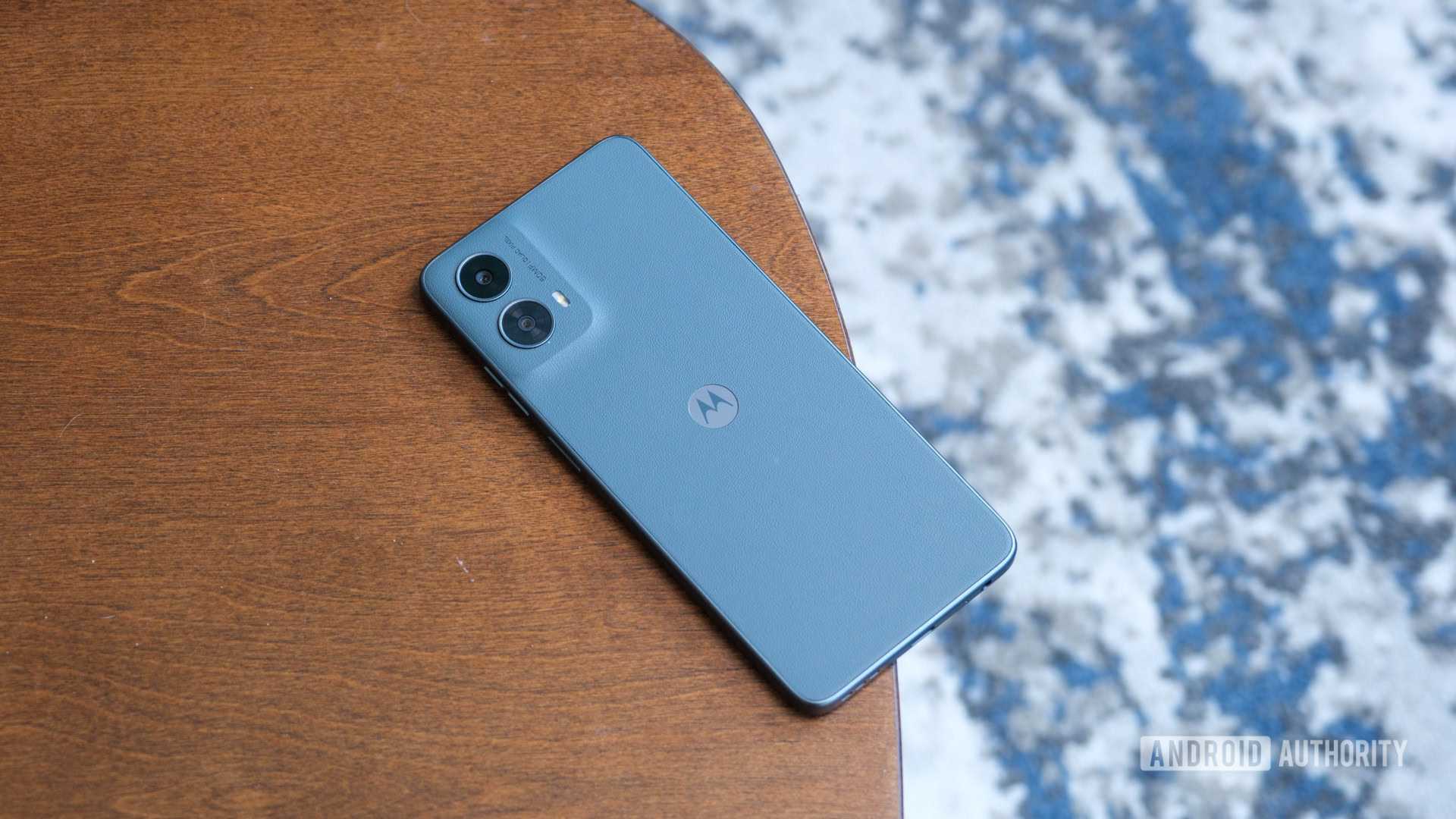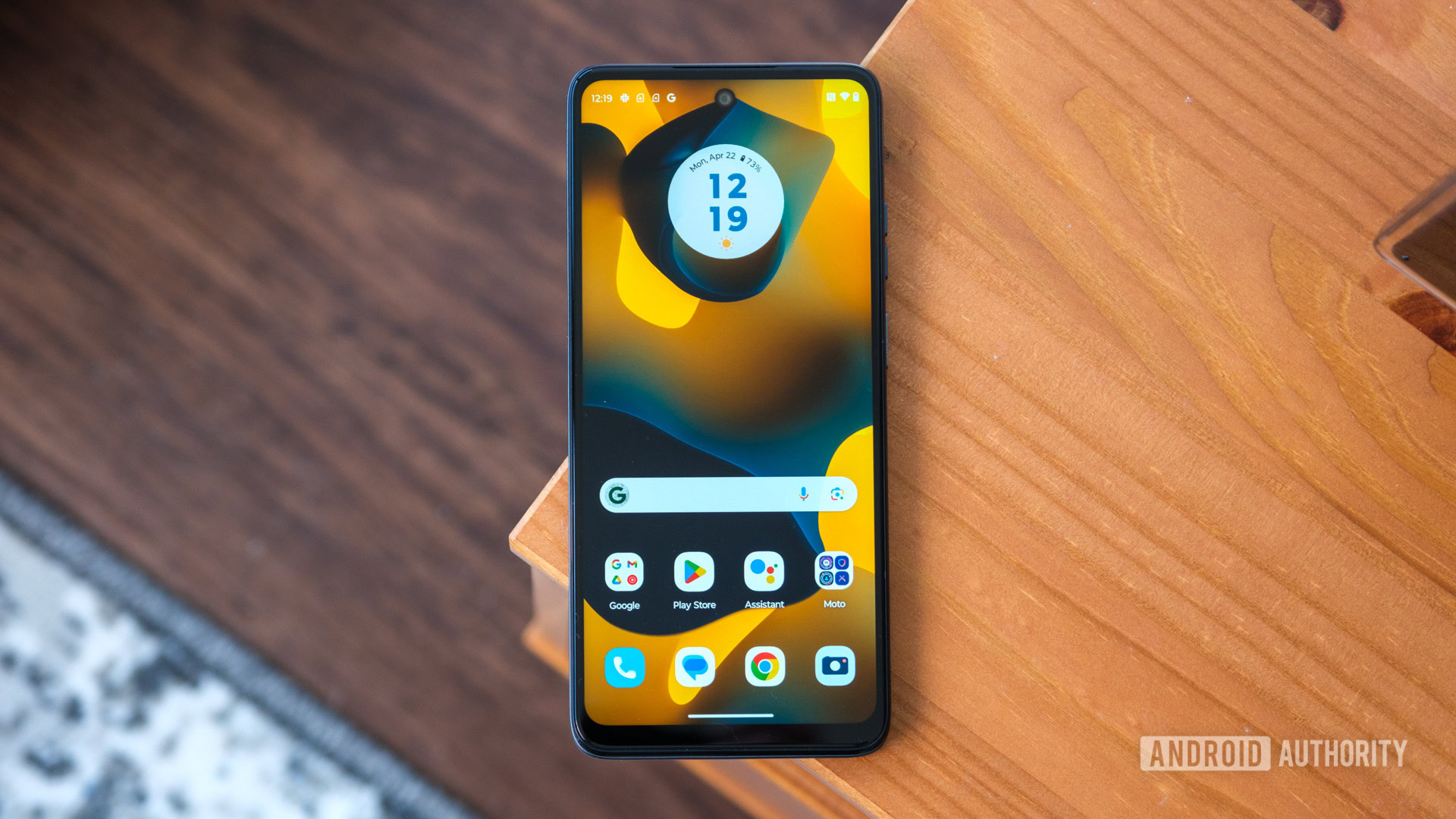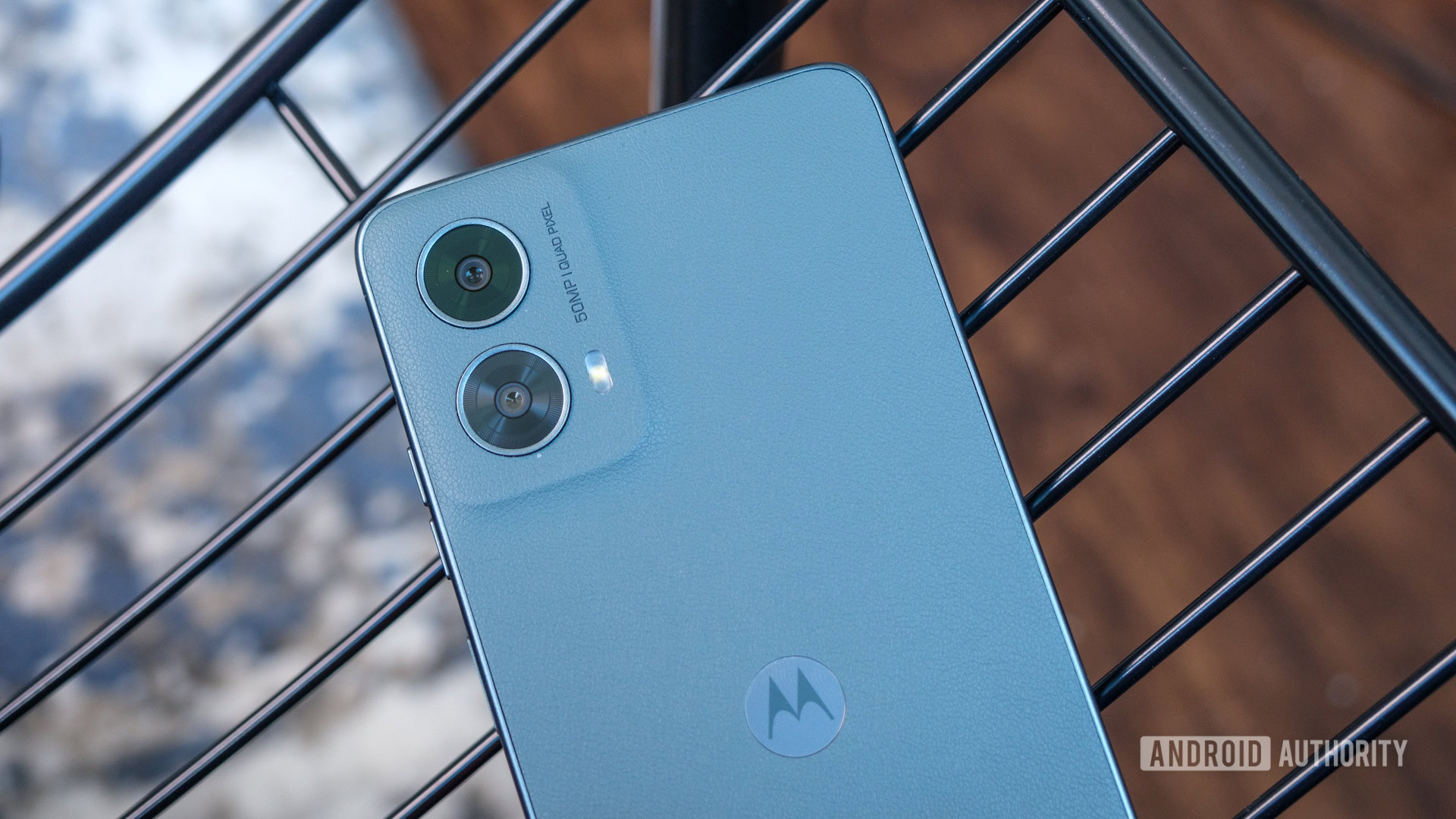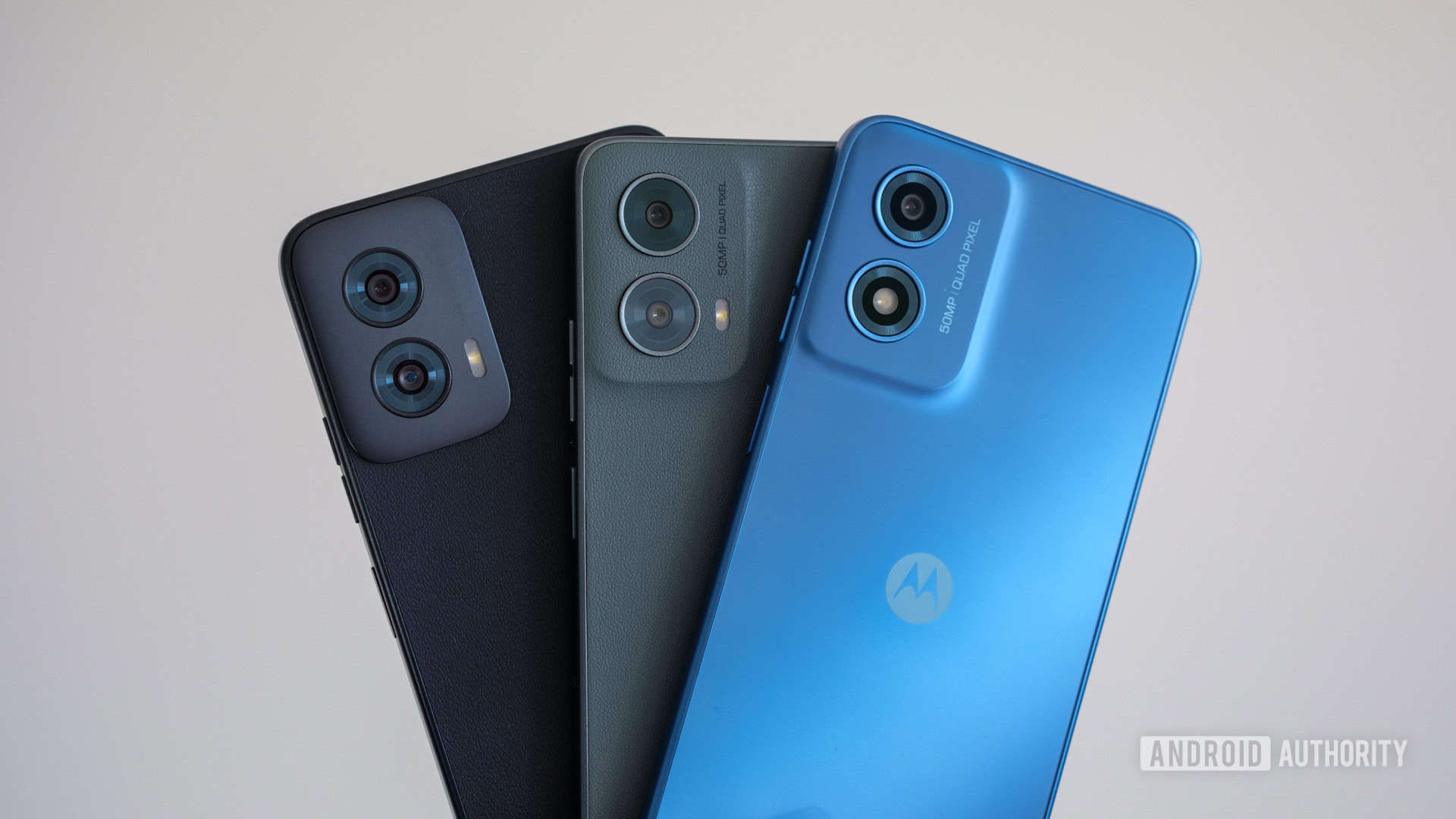Affiliate links on Android Authority may earn us a commission. Learn more.

Motorola Moto G 5G (2024) review: Should you buy it?
Published onDecember 3, 2024
Motorola Moto G 5G (2024)
MSRP: $199.99
What we like
What we don't like
Motorola Moto G 5G (2024)
Motorola Moto G 5G (2024) review: At a glance
- What is it? The Motorola Moto G 5G (2024) is the middle member of the 2024 Moto G lineup, replacing the 2023 model of the same name. It comes equipped with a Snapdragon 4 Gen 1 chipset, a pair of rear cameras, and a Sage Green vegan leather finish that feels as good as it looks. The Moto G 5G (2024) also packs NFC support (finally!), a headphone jack, and slightly improved wired charging.
- What is the price? The Motorola Moto G 5G (2024) costs $199 in the United States and CA$249 in Canada.
- Where can you buy it? The Motorola Moto G 5G (2024) launched in the US and Canada on May 2, 2024. It's available directly from Motorola, through retailers like Amazon and Best Buy, and through mobile carriers in both countries.
- How did we test it? I tested the Motorola Moto G 5G (2024) for seven days. Motorola supplied the review unit.
- Is it worth it? Although the Motorola Moto G 5G (2024) outperforms its more affordable siblings, it can't clear the increasingly high bar for budget Android phones. It still suffers from a weak update commitment, inflexible cameras, and limited charging options. Sure, it's one of the most affordable options, but spending a little more money will vastly improve your Android experience.
Should you buy the Motorola Moto G 5G (2024)?

Motorola’s Moto G series feels like the story of Goldilocks and the Three Bears. Forgive the pained metaphor ahead of time, but it’s true. The Moto G Play (2024) is Baby Bear, offering just the basics but doing so at a low price. The Moto G Power 5G (2024) is Papa Bear, offering the fastest charging, the best cameras, and the most power at a higher price. As you might have guessed, that leaves the Moto G 5G (2024) to fill the role of Mama Bear, landing somewhere between the Power and the Play with features like 5G and NFC (after years of not having the latter for baffling reasons) but slower charging and less flexible cameras. So, let’s find out if this affordable Android phone is just right.
Starting with the design, the Moto G 5G (2024) looks and feels closest to its premium Motorola Edge inspiration. It combines the fingerprint-resistant vegan leather back of the Moto G Power 5G with a camera bump that melds smoothly into the rest of the back panel, much like the Moto G Play. However, the Moto G 5G (2024) swaps the black, blue, and pink finishes of its siblings for a Sage color that’s easily the best of the bunch. It’s similar to the shade used on the more affordable Motorola Razr from 2023, appearing green in some lighting and almost gray in others.
The Motorola Moto G 5G (2024) is the middle member of the 2024 Moto G lineup.
Of course, the rest of the Moto G 5G (2024) is made of plastic — like most budget Motorola devices are — but the soft texture feels much better in hand than the slick plastic of the Moto G Play. Sure, vegan leather is technically just dressed up plastic, but it makes a big difference over a hard, slippery back when you’re holding your phone for hours on end. Motorola’s plastic frame is surrounded by the usual slate of buttons and ports, planting the fingerprint reader and volume buttons on the right with a headphone jack next to the USB-C port on the bottom edge, meaning you could probably find your way around in the dark if you’ve ever used another Moto G device.
Motorola’s dedication to the headphone jack is a love story for the ages, and I’m glad it’s still around. It’s better than relying on the Moto G 5G’s stereo speakers (a down-firing unit and the earpiece), which have a one-two punch of problems. They’re painfully quiet at anything less than full volume, yet badly distorted once you max them out — there’s no comfortable middle ground.
The Moto G 5G’s 6.6-inch LCD panel is another compromise between the Moto G Play and Moto G Power. It shares a lower HD+ resolution with the former (1,612 x 720) but adds the latter’s 120Hz refresh rate. On paper, the combination should be a good one, bringing a little extra power to the $200 price point, but the panel suffers from one of the Moto G Power’s most significant flaws: The viewing angles are atrocious. I’m not sure if Motorola tried to add a privacy screen protector, but the result is that you can barely see what’s on the Moto G 5G’s display unless you’re looking right at it. This is perfectly fine if you’re trying to keep notifications to yourself, but reading a recipe off the Moto G 5G (2024) is almost impossible while cooking. The low resolution of the Moto G 5G further hamstrings it, with everything from YouTube videos to watching We Own This City on Max coming out just a bit too fuzzy.
Unfortunately, Motorola also cut a few other corners to keep the Moto G 5G’s price low. The phone only comes with a Gorilla Glass 3 display, which is the bare minimum for durability. You also won’t find an official IP rating, though that’s less of a given at this price. Motorola says its Moto G lineup is water-repellent but can’t withstand jets of water or submersion, so be careful in anything heavier than light rain.
The vegan leather back feels great in the hand, but Motorola's budget materials are hardly durable.
Adding to the cost-saving compromises, let’s dig into the Moto G 5G’s software. If you’re familiar with the Moto G series, you probably know what’s coming, and it’s not great. Although the Moto G 5G (2024) ships with Android 14 right out of the box, Motorola is only promising a single Android update, so it’ll eventually get Android 15, which is slated to launch later this year — but that’s it. Our unit also came with the February 1, 2024, security patch out of the box and is in line for just two years of security support. Yes, it’s a budget phone, but keep in mind the identically priced Samsung Galaxy A15 5G is covered for four years of software updates to keep it ahead of Motorola.
Thankfully, there are still a few things to like about Motorola’s My UX experience. It still looks and feels largely like stock Android, with several colorful personalization options and an app drawer almost identical to what you’d find on a Google Pixel device.
However, Motorola has sold out several other parts of its software experience to keep its price low. Simply put, ads are everywhere — even when you don’t realize they’re ads. Motorola prompts you to install shopping, gaming, and entertainment hubs as part of the setup process, each of which opens with a preselected list of apps that it thinks you might want. There’s no rhyme or reason to the recommendations, and if you exit the hub using the “Done” button, they’ll start downloading to your phone, further limiting your 128GB of storage.
Worse, Motorola replaced its previously good weather app through a new partnership with 1Weather. The new weather app — which has plagued the recent crop of Moto G phones, all the way up to even the Moto G Stylus 5G (2024) — has ads in several places on the main screen, a section of videos called 1Weather Shorts, and links to weather articles from other sites — links that barely open under the app’s own weight. The app can’t stand on its metaphorical feet, as it lags badly when trying to scroll down to check the radar. Interestingly, if you uninstall 1Weather, the Moto G 5G defaults to the basic Accuweather app, which is a better, more straightforward experience.
Motorola’s software overhaul doesn’t stop there, either. It’s also introduced a partnership with Glance that’s supposed to liven up your lock screen but actually just offers random news articles throughout your day. I think it’s meant to work like a pared-down version of Google Discover, but I’ve yet to find a reason to open a Glance article over a Google Discover one — especially when Discover works like a news feed while Glance gives you one article at a time.
Under the hood, the Moto G 5G (2024) nails its Mama Bear billing. It lands perfectly in between the Moto G Play and Moto G Power with the not-too-common Snapdragon 4 Gen 1 chipset, something we’ve otherwise only seen on the Redmi Note 12 series. It’s backed by 4GB of RAM and an expandable 128GB of storage, which are standard for Motorola. The Moto G 5G (2024) isn’t just a middle-man on paper, either.
Whether it’s the all-around Geekbench 6 and PCMark tests or the graphics-focused 3DMark stress test, the Moto G 5G (2024) lands in the middle of the budget Android segment. It outperforms more affordable devices like the Moto G Play and similarly priced ones like the Samsung Galaxy A15 5G yet falls behind more premium offerings like the Moto G Power 5G, Samsung Galaxy A25 5G, and Galaxy A35 5G. Motorola’s middle Moto G doesn’t seem to mind being put under stress, either, turning in almost identical scores across a full 20 Wild Life runs — something the more expensive Moto G Power 5G can’t do due to its lack of specific Vulkan API extensions. Granted, the Moto G 5G’s decent score is still very much a budget score, so it won’t nail demanding games, and the frame rates are low to begin with — just good relative to the overall cost. Will we ever know why the Snapdragon 4 Gen 1 chipset has extensions that the more powerful Dimensity 7020 lacks? Probably not, but that’s the Moto G series in a nutshell.
Anyway, the Moto G 5G (2024) puts a decent shift in day-to-day life, too — provided you give it some time to warm up. I’ve noticed that the phone struggles when jumping into apps or switching between apps after you first power it on, but it tends to get with the program after a few minutes. Once it’s up to speed, I haven’t noticed any issues bouncing between light tasks like social media and using the Moto G 5G to follow recipes in my kitchen — though the viewing angles are, again, terrible. I tried to give the Moto G 5G (2024) a chance as my travel device for a recent trip home but found myself itching to get away from the low-resolution display, occasional chipset lag, and annoying software quirks. Sure, it’ll cover the basics, but spending more on your next phone will vastly improve your experience.

Even the Moto G 5G’s cameras are a case of Motorola finding a middle ground between its top-end and bottom-end budget devices. It picks up the 50MP primary camera that’s become standard across the 2024 lineup but paired it with the lowly 2MP dedicated macro sensor we’ve bemoaned for years. The upgraded primary sensor is a welcome change, and the maximum aperture of f/1.8 should allow for quicker shutter speeds and potentially some better bokeh in your shots, even outside of portrait mode. Still, it’s tough to see the overall pairing standing up well against some of the best budget camera phones.
Unless you’re a big-time macro fan, you’ll probably use the primary sensor for almost all of your shooting. It bins down to 12.5MP images by default, and while there doesn’t seem to be a way to capture full-resolution shots, you can toggle over to the Pro tab to output RAW files for a little more post-processing flexibility. I chose not to do that during my testing, instead relying on Motorola’s baked-in Auto Enhance feature, which is what most users will probably do as well.
Take the 50MP primary sensor, leave the dedicated 2MP macro.
As you can see below, the Moto G 5G (2024) is best described as all over the place. Sometimes, it hands in a decent result, nailing the colors of the rack of kayaks and perfectly pausing the waving Maryland flag, but other times, it simply has a mind of its own, like whatever happened to the sky above the Washington Monument. The bottom of the scene looks like the bright, sunny day that it was, while the sky above the trees would have you believe that a storm was rolling in.
Also, Motorola’s attempt at low light on the Moto G 5G (2024) is pretty much unusable. Sure, you can tell that the ship in the harbor is a ship, but it’s blurry, the colors look washed out, and the lights in the background are badly blown out. The shot of the neon sign isn’t much better, with limited detail across the wood paneling and the neon letters themselves melding together.
The story doesn’t get much better when you try to zoom in, either — even in good lighting. On a sunny day, I headed to Baltimore’s Broadway Pier, a spot I know well, figuring there would be no better chance for the Moto G 5G to capture colors and details. It handled the colors decently well, with only a slight shift as I got to the longer lengths, but the details started falling off from 2x zoom onward. Several of the bricks appear oversharpened at 2x zoom, making them look a bit too artificial, and then the sharpness disappears completely at 4x zoom, with the bricks merging into one red mass.
Somehow, the simple 2MP macro sensor landed closest to what I expected on the Moto G 5G (2024), but perhaps it’s because I didn’t expect much. Both flowers below look decent, given the meager resolution, with the long stem in the middle of the pink flower coming out surprisingly sharp. I’d still rather have software-based Macro Vision from an ultrawide sensor, but the Moto G 5G (2024) is limited by its price point.
Around the front, the Motorola Moto G 5G (2024) packs an 8MP punch hole selfie camera. As much as I’d like to say it’s an example of how far a low-resolution sensor can carry a phone, it’s not great. Although you get some detail in my face and hair, my beard comes out a bit soft, and the area around my eyes is far too dark. The background details in the non-portrait selfie aren’t good, either, with the brick promenade and water of the harbor all but wishing they were bokeh’d away.
The final nail in the Moto G 5G’s camera coffin is that its video specs simply aren’t up to snuff. It only supports 1080p recording at 30fps from the front and rear cameras, meaning all of your footage won’t enjoy a smooth 60fps capture rate. Motorola’s stabilization is decent, but the camera is slow to shift focus, which makes something like a simple pan come out jumpy. You can also record from the macro sensor if you’re into that.
Perhaps the Moto G 5G’s weakest camera link isn’t its sensors but the Snapdragon 4 Gen 1 chipset. It feels like it’s a step or two behind when processing images after you press the shutter button. Now, I don’t recommend jumping into your camera roll every time you snap a photo, but the times that I have, I’ve had to wait as long as 15 seconds before getting a final result. I’m not expecting instant results, but 15 seconds feels exceptionally long when the Moto G 5G is just polishing a 12.5MP photo. If you want to look at full-size versions of the images above (and several more), you can do so at this Google Drive link.
Despite its overall struggles, there’s one area where the Moto G 5G (2024) puts in a pretty good shift: its battery and charging setup. It carries the same 5,000mAh cell that you’ll find on the rest of Motorola’s budget lineup, and the Snapdragon 4 Gen 1 processor sips through power rather than chugging it. Our controlled battery drain test also worked out in the Moto G 5G’s favor, turning in the best web browsing and simulated Zoom meeting scores of the Moto G trio. The gap between each Moto G device wasn’t very big, though, so the battery performance would probably level out over a typical mixed day of usage. Also, keep in mind that the gap in the graph is due to the fact that none of the Moto G devices tested are capable of recording video in 4K, which is a pretty glaring oversight in 2024. Seriously, take the macro sensor and give us 4K video, Motorola.
When you drain the battery, the Moto G 5G (2024) settles back into its comfortable spot in the middle of the road. It offers 18W wired charging, landing right between the Moto G Play’s 15W wired speeds and the Moto G Power 5G’s 30W option. That difference in wired speed is a big one, though, with the Moto G 5G taking 20 minutes longer to charge than the Moto G Power and saving just 10 minutes over the Moto G Play. Motorola no longer includes a charger in the box in all markets, and when it does, it’s not capable of the full 18W charging speeds, so you’ll probably have to grab one from our current best wall chargers.
Ultimately, if you were looking at the Motorola Moto G 5G (2024) and hoping it would be “just right” as a budget phone, you might need to keep looking. Yes, it lands between the Moto G Play and the Moto G Power in price, specs, and size, but it falls just a bit too close to the former to make it worthwhile. Its performance, charging, and camera flexibility are certainly better than the lowly Moto G Play, but the lack of an ultrawide option and omission of wireless charging make spending an extra $100 on the more capable Moto G Power 5G a much better decision. Then again, maybe none of Motorola’s Moto G options hits the mark this year, at least not compared to several other budget-friendly devices currently on the market. Speaking of…

What are the best Motorola Moto G 5G (2024) alternatives?

If you’ve decided that the Motorola Moto G 5G (2024) might not be the one for you, fear not. There are several other budget-friendly Android phones to check out, and we’ve picked out just a few of them:
- Motorola Moto G Power 5G (2024) ($299.99 at Amazon): Although it doesn’t come with a better update commitment, the Moto G Power 5G does just about everything else better than the Moto G 5G. It has more flexible rear cameras and wireless charging, though the lack of Vulkan API extensions makes gaming tricky.
- Samsung Galaxy A25 5G ($299.99 at Amazon): Samsung’s top alternative to the Moto G 5G might have a smaller display, but it’s sharper and adds an ultrawide camera for better flexibility. It also has faster wired charging and a much better promise of future software support.
- OnePlus Nord N300 ($228 at OnePlus): OnePlus hasn’t added to its budget-friendly Nord lineup in a while, so the N300 remains your best bet. It only has one usable rear camera, but it charges 33W and still comes with a full-speed charger.
- Samsung Galaxy A15 ($174.8 at Amazon): Samsung’s entry-level Galaxy A15 5G matches the Moto G 5G on almost all fronts and, in many cases, offers more for the same price. It has a more flexible triple camera setup, significantly better update commitment, and faster 25W wired charging.
- Nothing Phone 2a (£319.99 at Amazon): The Nothing Phone 2a is one of the best-looking budget phones… perhaps ever. There’s something about the Pixar-esque design that just feels right and works perfectly with the company’s signature Glyph Interface. Just remember that limited US support and a developer registration program requirement to even get one means this one is for those shopping in Europe and other markets, or US folks willing to suffer through the issues.
Motorola Moto G 5G (2024) specs
| Motorola Moto G 5G (2024) | |
|---|---|
Display | 6.6-inch LCD 1,612 x 720 resolution (HD+) 120Hz refresh rate 269ppi |
Processor | Qualcomm Snapdragon 4 Gen 1 |
RAM | 4GB |
Storage | 128GB |
Power | 5,000mAh battery 18W wired charging No wireless charging |
Cameras | Rear: - 50MP wide, f/1.8, PDAF, OIS - 2MP macro, f/2.4 Selfie: - 8MP, f/2.0 |
Audio | Stereo speakers Headphone jack Dolby Atmos |
Video | 1080p/30fps |
Durability | Plastic frame Vegan leather back Gorilla Glass 3 display |
Connectivity | Wi-Fi 5 Bluetooth 5.1 |
Biometrics | Side-mounted fingerprint reader |
Ports and switches | USB 2.0 via USB-C |
Software | Android 14 |
Dimensions and weight | 164.4 x 74.9 x 8.2mm 194g |
Colors | Sage Green |
Motorola Moto G 5G (2024) review: FAQ
Yes, the Moto G 5G (2024) has NFC support.
No, the Moto G 5G (2024) doesn’t have wireless charging, only 18W wired charging.
Yes, the Moto G 5G (2024) supports both eSIM and dual-SIM.
Yes, the Moto G 5G has a fingerprint reader in its power button.
No, the Moto G 5G has a permanent 5,000mAh cell.
Yes, the Moto G 5G (2024) comes with 128GB of storage that you can expand via a microSD slot.